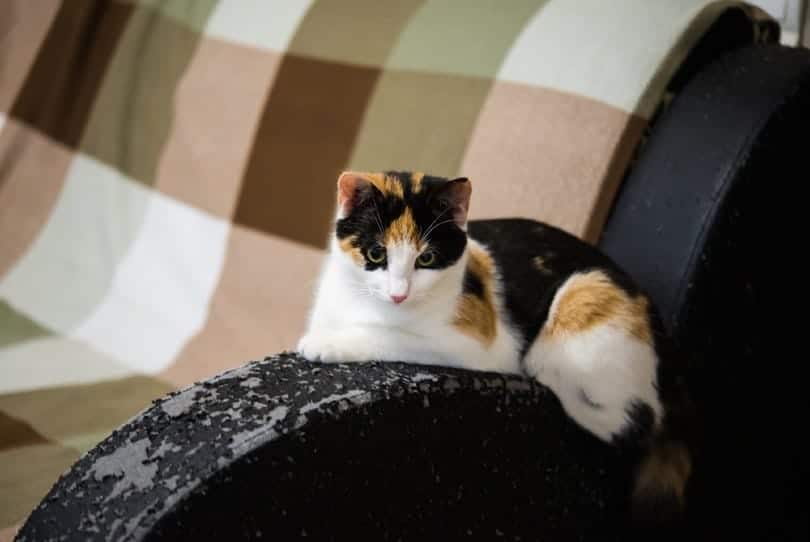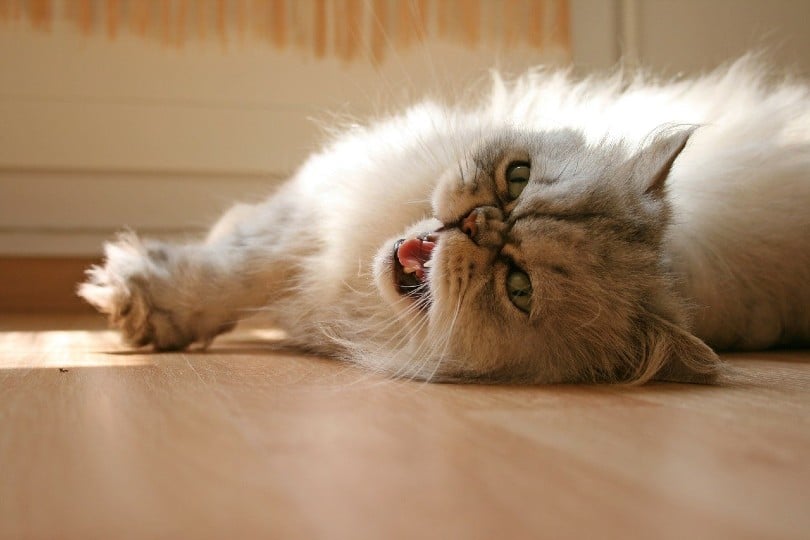Scratching and clawing inanimate objects is common to cats, and they all do it. Though it’s frustrating and can be destructive at times, it’s also important to understand there’s a purpose to a cat’s scratching and clawing.
If you have a cat that won’t stop scratching your furniture, you’re probably wondering how to make them stop it, which is why we’ve put together this handy guide to help you prevent your cat from shredding your sofa!
Nothing is worse than purchasing a new sofa only to discover upon returning home that your cat or kitten tore it to ribbons, or discovering deep scuffs in your recently painted door frames. Although it may seem like your cat is trying to cause trouble, it’s important to know that scratching at carpet and furniture is a deeply ingrained instinct and has numerous benefits to both their health and wellbeing. Cats scratching furniture can be a real problem, especially if you’re house proud!
Continue reading to learn how to prevent cats from scratching furniture and why they seem to choose your favorite spots every time.
Why do cats scratch furniture and carpets?
Although it might appear that your cat only enjoys destroying things, there are a variety of reasons why they might scratch furniture. Cats may scratch for a variety of reasons, such as boredom, scent marking, physical exercise, or the desire to keep their claws sharp.
Your cat is not trying to irritate you if you frequently find them scratching carpets. Scent glands on cats’ paws allow them to detect their territory within the house by releasing a chemical and visual scent marker when they scratch objects. They’ll probably go for noticeable, well-trafficked areas like couches, carpets, or even your favorite armchair. This is due to the fact that by leaving their scent on objects, scratching these areas will increase their sense of security and reduce stress, making them feel more like their home.
Why Your Cat Might Be Scratching Your Furniture
Your cat may be scratching at your furniture for a variety of reasons. First of all, it’s important to realize that cats are naturally inclined to scratch. Cats have been observed scratching at objects even after they have been declawed, a procedure we do not advise. The most frequent explanations for why your cat might use your furniture as a scratching post are listed below.

Scratching provides cats with much-needed exercise for happiness and health. Every time a cat scratches, their forelimbs, spine, and leg muscles get a little exercise. Some cats scratch using their weight as resistance, using nearly every muscle in their body to do so. Cats who do not go outside for exercise tend to scratch more frequently indoors.
Scratching helps cats maintain healthy claws as time goes on. The outer husks of the claws loosen and fall off when someone scratches, allowing new claw growth to occur. Frequent scratching can lessen the need to cut a cat’s claws, which is never enjoyable for either the cat or the owner.
6 Reviews Hepper Cat Nail Clipper Kit – Small and Large…
- Complete Set: Since this set of cat nail clippers comes with both a large and small pair, it’s ideal for
- The most comfortable cat nail clippers for indoor cats are made of razor-sharp stainless steel, which offers a quick
- Safety First: Using a locking spring and safety nail guard, you can ensure that each grooming cut is
Keeping your cats paws healthy starts with keeping their nails trimmed. A great set of clippers like the Hepper Cat Nail Clipper Set can help you safely and easily do this at home. This set includes two sizes of clippers with stainless steel blades, built-in safety guards, and comfortable handles, along with a nail file and a storage pouch. Get ready for easy nail trimming!
After years of admiring Hepper, we at Catster made the decision to acquire a majority stake in order to gain access to this innovative cat company’s amazing designs!
Another reason a cat might choose to scratch on the furniture is boredom. They may become obsessed with scratching all day if they have nothing better to do, which could harm the furniture and other items in the house. Cats who have lots of toys and spend time with their families are less likely to scratch because they’re bored.

Cats that are attention-seekers may choose to scratch furniture even if doing so draws unfavorable attention. Certain cats are constantly seeking attention and will stop at nothing to get it. But the majority of cats will only scratch to get attention if they are ignored by their friends or left on their own all day, every day.
Cats can become overly excited and playful at times, causing them to run up and scratch your furniture in between jumping on a toy or a feline friend. Most owners don’t have to worry about scratching too much when playing games. Typically, the behavior occurs in spurts over the course of a certain amount of time.
FAQ
What percentage of cats scratch furniture?
Is it common for cats to scratch furniture?
Can you train a cat not to scratch furniture?
What cats do not scratch furniture?